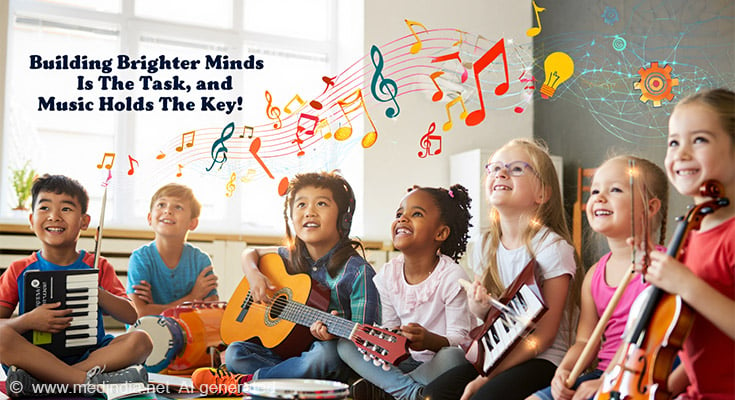Music can enhance youngsters’ emotional recognition, consideration, and mind improvement.
- Music helps youngsters learn feelings, even with out facial cues
- Rhythm observe improves consideration and speech abilities
- Early, participating music periods enhance mind plasticity
Consultants emphasize that music isn’t simply entertainment-it’s a robust device for shaping emotional habits and cognitive improvement in youngsters.
How Do Younger Kids Acknowledge Feelings in Music?
Penn researchers examined 144 Philadelphia-area youngsters aged 3 to five years. The kids have been instructed to hearken to a 5-second music clip and match it to emotional faces (happiness, unhappiness, calmness, and concern).
- Outcomes confirmed that youngsters grew to become extra correct in recognizing feelings with age, even inside this early window of improvement.
- Kids rated by their mother and father as having cold-natured traits (low empathy, decreased guilt, blunted have an effect on) carried out worse general in figuring out feelings—besides when recognizing fearful music, which they interpreted efficiently.
Researchers emphasize that music might function a novel various channel for emotional socialization, particularly for kids who wrestle to interpret facial cues. This can be utilized successfully to achieve the emotional processing methods when visible cues fail. Music can supply a brand new sense of course when it comes to remedy and schooling (1✔ ✔Trusted Supply
Understanding how younger youngsters acknowledge feelings in music
).
How Musical Coaching Shapes the Thoughts?
1. Instrumental Coaching
Musical coaching with devices is a dependable indicator in strengthening abilities which are carefully associated to music, like high quality motor management, rhythm notion, and discrimination.
Some research even confirmed optimistic results in language-related duties (phoneme discrimination, vocabulary, and reading-related abilities), govt functioning (consideration, working reminiscence, task-switching), and different areas of educational efficiency, however these findings didn’t maintain true throughout different research.
2. Music Rhythm
Even the beat of a tune might help with sensorimotor synchronization and temporal consideration. Since delivery, people have been capable of acknowledge musical beats, which helps with studying, speech notion, and timed cognitive processes. Actions like tapping to a rhythm, as an illustration, have been linked to higher studying and a focus checks.
3. Reward, Motivation, and Emotional Engagement
Music will be extremely rewarding and emotionally stimulating, with its reward worth selling studying and neuroplasticity. Intrinsically rewarding, optimistic reinforcement-based, and lively coaching engages dopaminergic circuits and produces larger neuroplastic adjustments than passive publicity. These advantages are additional amplified by the well-being and social studying fostered via the fulfilling, collective expertise of group music-making, similar to in choirs and ensembles.
4. Mind Structural Modifications
After sustained musical coaching began in childhood, youngsters exhibited structural and purposeful mind adjustments, e.g., enlargement or altered improvement within the motor cortex, corpus callosum, and first auditory areas. Early and intensive coaching results in stronger adjustments in mind wiring. Nonetheless, quick applications (≈1 12 months) might present purposeful positive factors earlier than vital structural adjustments.

5. Delicate Intervals & Age of Onset
Early engagement (and constant observe) produce bigger and quicker adjustments than late begins, though motivation and high quality of instruction stay very important moderators (2✔ ✔Trusted Supply
How musical coaching impacts cognitive improvement: rhythm, reward and different modulating variables
).
| Focus Space | Key Technique | Objective |
|---|---|---|
| Emotion & Social Expertise | Use quick music clips (comfortable, unhappy, calm, fearful) to label emotions and match to faces/tales | Construct emotional vocabulary, help youngsters with facial cue difficulties |
| Cognitive Beneficial properties | Common rhythm observe (clap, faucet, transfer, group play) paired with social rewards | Enhance consideration, speech processing, mind plasticity |
| Intervention | Quick, frequent, age-appropriate periods; deal with beat sync; observe abilities pre/publish | Enhance motor, language, consideration; maintain motivation |
Music is a common language, understood even by toddlers. Past comprehension, it shapes younger minds and feelings, guiding them towards a brighter future!
Commercial
References:
- Understanding how younger youngsters acknowledge feelings in music – (https://penntoday.upenn.edu/information/sas-psychology-understanding-how-young-children-recognize-emotions-music)
- How musical coaching impacts cognitive improvement: rhythm, reward and different modulating variables – (https://pmc.ncbi.nlm.nih.gov/articles/PMC3957486/)
Supply-Medindia